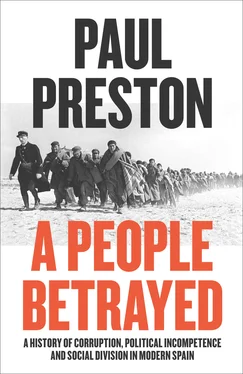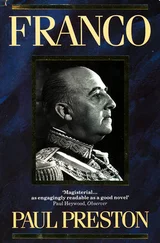Despite the reality that a vastly more numerous Spanish army had been defeated, there grew the myth cherished by General Franco that Spanish heroism had held out against overwhelming odds and been ‘cheated’ by technological superiority. Contemporary imagery about the greasy capitalist pig trampling on the dying Spanish lion contrasted with the American view that moral superiority and technical know-how had overcome a decadent enemy. Franco’s perception would continue to reverberate through his career. He was five and a half when the great defeat at the hands of the United States occurred. Although, at such an age, he cannot have been aware of the significance of what was happening, he saw the coffins and the wounded being landed in the small naval garrison town of El Ferrol where he lived. Thereafter, the disaster had an ongoing effect that influenced him profoundly. Many of his schoolmates wore mourning, having been orphaned or lost relatives. Mutilated men were seen around the town for many years. Living in a military family, he heard the indignant conversations that his father had with colleagues from the naval base in which the defeat was blamed on dark forces such as freemasonry. An essentially middle-class intellectual movement, freemasonry was vilified by the Catholic Church for its anti-clericalism and by army officers because of its foreign links. Subsequently, when Franco became a cadet in the Military Academy, he encountered an atmosphere which had festered since 1898. Just as in Ferrol, in Toledo defeat was attributed to the machinations of American and British freemasonry and to the treachery of Spanish politicians who had sent naval and military forces into battle with inadequate resources.45
The aftermath of defeat saw private grief and public chagrin at the destruction of the illusion of Spanish great-power status. Newspaper editorials, intellectuals and politicians raked over the so-called ‘dying nations’ speech made on 4 May 1898 by the British Prime Minister Lord Salisbury to the Conservative Party’s Primrose League at the Royal Albert Hall. Salisbury had stated that ‘the living nations will gradually encroach on the territory of the dying’. His words were taken as an accurate prophecy of the future of Spain.
While the agonized inquest went on, the economic ruin that had been expected to follow the loss of empire failed to materialize. There was a minor economic boom as the return to peace brought lower inflation, less public debt and a higher level of capital investment. The drop in the value of the peseta occasioned by defeat stimulated an export boom to other European countries. Some products, such as footwear, olive oil and garlic, were still in demand in Cuba and Puerto Rico. Moreover, there were unexpectedly good harvests in both 1898 and 1899 which increased rural demand for industrial goods, as did the return of 200,000 colonial troops flush with wage arrears to spend on new clothes. Most importantly, there was a massive repatriation of capital from Spanish America. The return of colonial settlers brought both investment and entrepreneurial expertise to the areas, such as Galicia, from which they originated. Nonetheless, although the consequences of 1898 were less dramatic than might have been feared, they were still deeply damaging for the Atlantic ports and the Catalan textile industry. Already inefficient, built on a proliferation of small family firms with out-of-date machinery, Catalan textiles had survived on protection from foreign competition and a guaranteed overseas market. Both advantages disappeared with the loss of Cuba.46
Moreover, the few favourable circumstances that followed the disaster were short-lived. The troops had soon spent their back pay. With subsequent harvests poor, domestic demand slumped. By the autumn of 1900, more than thirty factories in Catalonia had been closed and, in others, workers were being laid off. Industrial militancy was on the increase. Accordingly, the loss of Cuba fostered resentment of Madrid and accelerated the development of Catalan nationalism. Government measures to balance the budget and pay off the war debt provoked a taxpayers’ strike, the so-called tancament de caixes , shop closures and riots. It also fostered the growth of the independence party, the Lliga Regionalista. Eventually, Catalan industry would find new markets, especially in Argentina, and would also diversify into automobiles, electricity and chemicals. However, there remained the problem that the army was assuaging its guilt by concentrating its anger on Catalonia. Since the middle of the eighteenth century, the Spanish army had known nothing but defeat at the hands of foreign enemies, its only successes being chalked up in domestic civil wars. It was hardly surprising that, when the last significant remnants of empire were lost, the army would cling to a determination that the final battle that would not be lost was the defence of national integrity. Ironically, the defeat which thus fed the flames of Spanish nationalism also breathed life into its greatest enemy.47
The reaction to this monumental humiliation, known thereafter as the ‘Disaster of 1898’, was a national examination of conscience. Regenerationism, as it was known, was an introspective analysis of what was wrong with Spain carried out by intellectuals and politicians in meetings, articles, books and private correspondence. The ‘generation of 1898’ grappled with the so-called problema nacional . The turmoil of the civil wars of the nineteenth century, the revolution of 1868, the chaos of the First Republic in 1873 and the loss of Cuba in 1898 had stimulated an endless poking through the national entrails. The progressive republican intellectual Ricardo Macías Picavea denounced the apparently legitimate institutions and democratic parliament of Restoration Spain as merely ‘the wallpaper with pictures of a parliamentary system which hid the wall of brick and plaster, the caciquismo that was the harsh reality of our government’.48 The towering figure of the regenerationist movement was the visionary Aragonese polymath, lawyer and agronomist Joaquín Costa Martínez. It was he who responded to the defeat with the war cry ‘Schools, larders and double padlocks on the tomb of El Cid’ – that is to say, no more military adventures. In 1902, at the age of fifty-six, he presented to the great intellectual club the Ateneo de Madrid his report ‘Oligarchy and caciquismo as the present form of government in Spain’. He denounced caciquismo and the oligarchy, the political system and the political class as the principal problems of Spain. He compared the cacique to a cancer or tumour, an unnatural excrescence on the body of the nation. Accordingly, the political class had putrefied and blighted Spain through caciquismo and its corrupt practices, obstructing the forces of progress and thus keeping the nation in servitude, ignorance and misery. The solution had to be the iron surgeon who would sweep away caciquismo to facilitate democratic reform: ‘That surgical policy, I repeat, has to be the personal burden of an iron surgeon, who knows well that anatomy of the Spanish people and feels for it an infinite compassion … For Spain to be a parliamentary nation tomorrow, she must renounce it today.’49 In fact, Costa insisted that his surgical solution was compatible with parliament and did not imply dictatorship.50 Ultimately, regenerationism was open to exploitation by both the right and the left since among its advocates were both those who sought to sweep away by democratic reform the degenerate political system based on the power of local bosses or caciques and those who planned simply to destroy caciquismo by the authoritarian solution of ‘an iron surgeon’, to put an end to representative politics and restore the values that were thought to have made Spain great – unity, Catholicism and hierarchy.
Читать дальше












